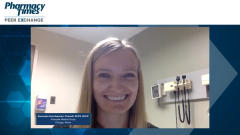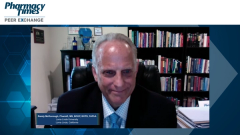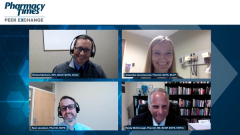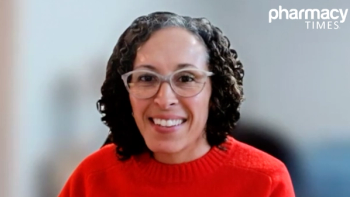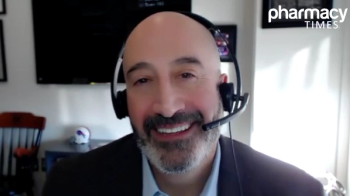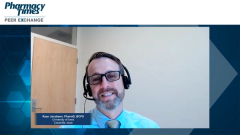
The Recent FDA Approval of Vericiguat for Heart Failure
A thought leader in the pharmacologic management of heart failure, Alexandra Goncharenko, PharmD, BCPS, BCCP, reviews the mechanism of action of vericiguat and considers its place in the treatment landscape.
Episodes in this series

Richard Mullvain, RPh, BCCP, BCPS, CCCC: There’s one more drug I want to talk about. This one has me a little perplexed, so maybe you guys can give me some clarity. I need to go back to Alex on this one. As you know, the FDA recently approved an agent known as vericiguat. It’s in a similar drug class to riociguat, a drug we’ve used for pulmonary arterial hypertension. I’ll let you help us, Alex. I’ll butcher it if I try to describe the mechanism of action. Can you tell us the mechanism of action for heart failure treatments and then talk a little about the VICTORIA trial that basically got it on the market? Have you begun to use this in your clinical practice? How does this fit in the guideline-directed medical therapy? Before I cut you loose, I’ll let you know that we haven’t really jumped on board yet, but it’s definitely on the radar screen. I’d love to get your take on vericiguat. Thanks for sharing, Alex.
Alexandra Goncharenko, PharmD, BCPS, BCCP: Vericiguat is a new drug. It targets endothelial dysfunction in patients with heart failure. The vascular endothelium normally generates nitric oxide, and that stimulates the soluble guanylate cyclase [SGC]-mediated cyclic GMP [guanosine monophosphate] production, or cGMP. Similarly, the endocardial endothelium is sensitive to nitric oxide and regulates contractility as well as diastolic function by raising that intracellular cGMP. In heart failure, this process becomes dysregulated, and there’s an insufficiency of cGMP and impairment of the diastolic relaxation and microvascular dysfunction. Vericiguat is a cyclic guanylate cyclase activator that modulates the SGC, enhances the effect of nitric oxide, and overall increases cGMP and nitric oxide. It’s a little complicated.
Richard Mullvain, RPh, BCCP, BCPS, CCCC: For my basic understanding, are we using nitric oxide to help relax the blood vessels and make it easier for the heart to pump? How is this making it easier for the heart in heart failure? Is that part of it?
Alexandra Goncharenko, PharmD, BCPS, BCCP: It’s similar to hydralazine nitrates. The mechanism of this is that it’s increasing nitric oxide availability. In patients with heart failure, there’s a theory of not being enough nitric oxide. It has vasodilatory as well as beneficial effects of nitric oxide on the blood vessels and myocardium.
Richard Mullvain, RPh, BCCP, BCPS, CCCC: That was great. That was a tough one. Thank you, Alex.
Alexandra Goncharenko, PharmD, BCPS, BCCP: The VICTORIA trial studied patients with high-risk heart failure specifically, who had recent heart failure decompensation and were treated with a hospitalization or with IV [intravenous] diuretics and also had elevated BNP [brain natriuretic peptide] levels. They were targeting a higher-risk heart failure population. Patients were started on 2.5 mg per day, titrated up to 10 mg per day. A benefit of this medication is it is once a day.
The trial did achieve a small but statistically significant reduction in their composite clinical end point of cardiovascular death or first hospitalization for heart failure. [Adverse] effects were minimal. There was no major risk, aside from mild hypotension and rare syncope. Overall, it was not necessary to adjust for renal dysfunction. It’s a pretty easy drug to use, in my opinion. But frequently in our clinical practice, we aren’t using this medication as much because its role is specific and unique for the high-risk population. The other major limitation is it’s another brand name medication. If patients are already on the 4 standard, this is going to be a fifth, so polypharmacy may prohibit multiple medications being added. Sometimes patients aren’t quite happy about adding even more.
Richard Mullvain, RPh, BCCP, BCPS, CCCC: Randy or Ryan, do you have anything to add about vericiguat?
Ryan Jacobsen, PharmD, BCPS: Alex did a really nice job describing it. It’s a bit early. I don’t think it’s ready for prime time yet, but time will tell.
Richard Mullvain, RPh, BCCP, BCPS, CCCC: I agree. There will be niche patients who we’ll want to try it on, but it’s not going to be used across the board at this point. But it’s very intriguing. I’m very curious to see where it’s going to go.
Transcript edited for clarity.
Newsletter
Stay informed on drug updates, treatment guidelines, and pharmacy practice trends—subscribe to Pharmacy Times for weekly clinical insights.

